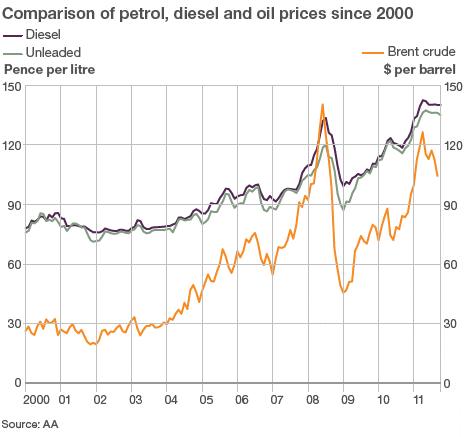Fuel duty rise due in January cancelled
- Published
The rise in fuel duty of 3p a litre planned for January will be cancelled, Chancellor George Osborne has said in his Autumn Statement.
A planned further increase of about 5p in August will be reduced to 3p.
As a result, Mr Osborne said the average family would save £144 a year on filling up their car.
He also said rail fares would be capped at inflation, measured by the Retail Price Index, plus 1%. Previously the cap was to have been RPI plus 3%.
Under the previous proposals, rail fares would have increased by 8% in January, whereas they will now rise by 6%.
This will apply across National Rail regulated fares, across the London Tube and on London Buses.
Transport groups welcomed the move but warned that fares would still rise sharply in January.
"We're delighted that the government has decided to ease the load on hard-pressed passengers, but rail fares are still a heavy burden, and commuters will face paying hundreds of pounds more for their season tickets in January at a time when they can ill afford it," said Stephen Joseph at Campaign for Better Transport.
'Relief'
The government had come under pressure from motoring organisations and MPs to scrap the rise in fuel duty.
AA president Edmund King welcomed Mr Osborne's decision to do just that.
"The chancellor has seen sense on this vital issue. Cash-strapped drivers will heave a heavy duty sigh of relief as current pump prices are close to the record high," he said.
Earlier this month, Conservative MP Robert Halfon tabled a Commons motion urging action on fuel prices in response to an e-petition signed by 110,000 people.
It was approved by MPs without an official vote, meaning the government did not have to act.
Mr Osborne scrapped the annual fuel tax escalator - a mechanism under which duty rose by 1p above inflation every year - and cut fuel duty by 1p in March's Budget.
